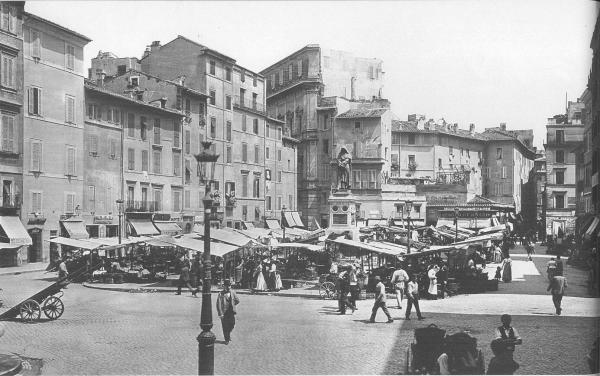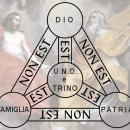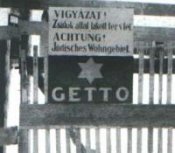W Rzymie na Campo di Fiori
Kosze oliwek i cytryn,
Bruk opryskany winem
I odłamkami kwiatów.
Różowe owoce morza
Sypią na stoły przekupnie,
Naręcza ciemnych winogron
Padają na puch brzoskwini.
Tu na tym właśnie placu
Spalono Giordana Bruna,
Kat płomień stosu zażegnął
W kole ciekawej gawiedzi.
A ledwo płomień przygasnął,
Znów pełne były tawerny,
Kosze oliwek i cytryn
Nieśli przekupnie na głowach.
Wspomniałem Campo di Fiori
W Warszawie przy karuzeli,
W pogodny wieczór wiosenny,
Przy dźwiękach skocznej muzyki.
Salwy za murem getta
Głuszyła skoczna melodia
I wzlatywały pary
Wysoko w pogodne niebo.
Czasem wiatr z domów płonących
Przynosił czarne latawce,
Łapali skrawki w powietrzu
Jadący na karuzeli.
Rozwiewał suknie dziewczynom
Ten wiatr od domów płonących,
śmiały się tłumy wesołe
W czas pięknej warszawskiej niedzieli.
Morał ktoś może wyczyta,
że lud warszawski czy rzymski
Handluje, bawi się, kocha
Mijając męczeńskie stosy.
Inny ktoś morał wyczyta
O rzeczy ludzkich mijaniu,
O zapomnieniu, co rośnie,
Nim jeszcze płomień przygasnął.
Ja jednak wtedy myślałem
O samotności ginących.
O tym, że kiedy Giordano
Wstępował na rusztowanie,
Nie znalazł w ludzkim języku
Ani jednego wyrazu,
Aby nim ludzkość pożegnać,
Tę ludzkość, która zostaje.
Już biegli wychylać wino,
Sprzedawać białe rozgwiazdy,
Kosze oliwek i cytryn
Nieśli w wesołym gwarze.
I był już od nich odległy,
Jakby minęły wieki,
A oni chwilę czekali
Na jego odlot w pożarze.
I ci ginący, samotni,
Już zapomniani od świata,
Język nasz stał się im obcy
Jak język dawnej planety.
Aż wszystko będzie legendą
I wtedy po wielu latach
Na nowym Campo di Fiori
Bunt wznieci słowo poety.
Kosze oliwek i cytryn,
Bruk opryskany winem
I odłamkami kwiatów.
Różowe owoce morza
Sypią na stoły przekupnie,
Naręcza ciemnych winogron
Padają na puch brzoskwini.
Tu na tym właśnie placu
Spalono Giordana Bruna,
Kat płomień stosu zażegnął
W kole ciekawej gawiedzi.
A ledwo płomień przygasnął,
Znów pełne były tawerny,
Kosze oliwek i cytryn
Nieśli przekupnie na głowach.
Wspomniałem Campo di Fiori
W Warszawie przy karuzeli,
W pogodny wieczór wiosenny,
Przy dźwiękach skocznej muzyki.
Salwy za murem getta
Głuszyła skoczna melodia
I wzlatywały pary
Wysoko w pogodne niebo.
Czasem wiatr z domów płonących
Przynosił czarne latawce,
Łapali skrawki w powietrzu
Jadący na karuzeli.
Rozwiewał suknie dziewczynom
Ten wiatr od domów płonących,
śmiały się tłumy wesołe
W czas pięknej warszawskiej niedzieli.
Morał ktoś może wyczyta,
że lud warszawski czy rzymski
Handluje, bawi się, kocha
Mijając męczeńskie stosy.
Inny ktoś morał wyczyta
O rzeczy ludzkich mijaniu,
O zapomnieniu, co rośnie,
Nim jeszcze płomień przygasnął.
Ja jednak wtedy myślałem
O samotności ginących.
O tym, że kiedy Giordano
Wstępował na rusztowanie,
Nie znalazł w ludzkim języku
Ani jednego wyrazu,
Aby nim ludzkość pożegnać,
Tę ludzkość, która zostaje.
Już biegli wychylać wino,
Sprzedawać białe rozgwiazdy,
Kosze oliwek i cytryn
Nieśli w wesołym gwarze.
I był już od nich odległy,
Jakby minęły wieki,
A oni chwilę czekali
Na jego odlot w pożarze.
I ci ginący, samotni,
Już zapomniani od świata,
Język nasz stał się im obcy
Jak język dawnej planety.
Aż wszystko będzie legendą
I wtedy po wielu latach
Na nowym Campo di Fiori
Bunt wznieci słowo poety.
envoyé par Krzysztof Wrona - 3/2/2014 - 00:25
Langue: italien
Traduzione italiana di Pietro Marchesani
Da "Poesie" di Czesław Miłosz
Adelphi
1983

Il testo trovato qui
Da "Poesie" di Czesław Miłosz
Adelphi
1983

Il testo trovato qui
CAMPO DEI FIORI
A Roma in Campo dei Fiori
ceste di olive e limoni,
spruzzi di vino per terra
e frammenti di fiori.
Rosati frutti di mare
vengono sparsi sui banchi,
bracciate d’uva nera
sulle pesche vellutate.
Proprio qui, su questa piazza
fu arso Giordano Bruno.
Il boia accese la fiamma
fra la marmaglia curiosa.
E non appena spenta la fiamma,
ecco di nuovo piene le taverne.
Ceste di olive e limoni
sulle teste dei venditori.
Mi ricordai di Campo dei Fiori
a Varsavia presso la giostra,
una chiara sera d’aprile,
al suono d’una musica allegra.
Le salve del muro del ghetto
soffocava l’allegra melodia
e le coppie si levavano alte
nel cielo sereno.
Il vento dalle case in fiamme
portava neri aquiloni,
la gente in corsa sulle giostre
acchiappava i fiocchi nell’aria.
Gonfiava le gonne alle ragazze
quel vento dalle case in fiamme,
rideva allegra la folla
nella bella domenica di Varsavia.
C’è chi ne trarrà la morale
che il popolo di Varsavia o Roma
commercia, si diverte, ama
indifferente ai roghi dei martiri.
Altri ne trarrà la morale
sulla fugacità delle cose umane,
sull’oblio che cresce
prima che la fiamma si spenga.
Eppure io allora pensavo
alla solitudine di chi muore.
Al fatto che quando Giordano
salì sul patibolo
non trovò nella lingua umana
neppure un’espressione,
per dire addio all’umanità,
l’umanità che restava.
Rieccoli a tracannare vino,
a vendere bianche asterie,
ceste di olive e limoni
portavano con gaio brusìo.
Ed egli già distava da loro
come fossero secoli,
essi attesero appena
il suo levarsi nel fuoco.
E questi, morenti, soli,
già dimenticati dal mondo,
la loro lingua ci è estranea
come lingua di antico pianeta.
Finché tutto sarà leggenda
e allora dopo molti anni
su un nuovo Campo dei Fiori
un poeta desterà la rivolta.
A Roma in Campo dei Fiori
ceste di olive e limoni,
spruzzi di vino per terra
e frammenti di fiori.
Rosati frutti di mare
vengono sparsi sui banchi,
bracciate d’uva nera
sulle pesche vellutate.
Proprio qui, su questa piazza
fu arso Giordano Bruno.
Il boia accese la fiamma
fra la marmaglia curiosa.
E non appena spenta la fiamma,
ecco di nuovo piene le taverne.
Ceste di olive e limoni
sulle teste dei venditori.
Mi ricordai di Campo dei Fiori
a Varsavia presso la giostra,
una chiara sera d’aprile,
al suono d’una musica allegra.
Le salve del muro del ghetto
soffocava l’allegra melodia
e le coppie si levavano alte
nel cielo sereno.
Il vento dalle case in fiamme
portava neri aquiloni,
la gente in corsa sulle giostre
acchiappava i fiocchi nell’aria.
Gonfiava le gonne alle ragazze
quel vento dalle case in fiamme,
rideva allegra la folla
nella bella domenica di Varsavia.
C’è chi ne trarrà la morale
che il popolo di Varsavia o Roma
commercia, si diverte, ama
indifferente ai roghi dei martiri.
Altri ne trarrà la morale
sulla fugacità delle cose umane,
sull’oblio che cresce
prima che la fiamma si spenga.
Eppure io allora pensavo
alla solitudine di chi muore.
Al fatto che quando Giordano
salì sul patibolo
non trovò nella lingua umana
neppure un’espressione,
per dire addio all’umanità,
l’umanità che restava.
Rieccoli a tracannare vino,
a vendere bianche asterie,
ceste di olive e limoni
portavano con gaio brusìo.
Ed egli già distava da loro
come fossero secoli,
essi attesero appena
il suo levarsi nel fuoco.
E questi, morenti, soli,
già dimenticati dal mondo,
la loro lingua ci è estranea
come lingua di antico pianeta.
Finché tutto sarà leggenda
e allora dopo molti anni
su un nuovo Campo dei Fiori
un poeta desterà la rivolta.
envoyé par Krzysiek Wrona - 19/4/2014 - 06:12
Langue: anglais
Traduzione inglese di Louis Iribarne e David Brooks
da "The Collected Poems: 1931-1987" (The Ecco Press, 1988)
Translated by Louis Iribarne and David Brooks
Testo trovato qui http://www.poetryfoundation.org/
da "The Collected Poems: 1931-1987" (The Ecco Press, 1988)
Translated by Louis Iribarne and David Brooks
Testo trovato qui http://www.poetryfoundation.org/
CAMPO DEI FIORI
In Rome on the Campo dei Fiori
baskets of olives and lemons,
cobbles spattered with wine
and the wreckage of flowers.
Vendors cover the trestles
with rose-pink fish;
armfuls of dark grapes
heaped on peach-down.
On this same square
they burned Giordano Bruno.
Henchmen kindled the pyre
close-pressed by the mob.
Before the flames had died
the taverns were full again,
baskets of olives and lemons
again on the vendors' shoulders.
I thought of the Campo dei Fiori
in Warsaw by the sky-carousel
one clear spring evening
to the strains of a carnival tune.
The bright melody drowned
the salvos from the ghetto wall,
and couples were flying
high in the cloudless sky.
At times wind from the burning
would drift dark kites along
and riders on the carousel
caught petals in midair.
That same hot wind
blew open the skirts of the girls
and the crowds were laughing
on that beautiful Warsaw Sunday.
Someone will read as moral
that the people of Rome or Warsaw
haggle, laugh, make love
as they pass by the martyrs' pyres.
Someone else will read
of the passing of things human,
of the oblivion
born before the flames have died.
But that day I thought only
of the loneliness of the dying,
of how, when Giordano
climbed to his burning
he could not find
in any human tongue
words for mankind,
mankind who live on.
Already they were back at their wine
or peddled their white starfish,
baskets of olives and lemons
they had shouldered to the fair,
and he already distanced
as if centuries had passed
while they paused just a moment
for his flying in the fire.
Those dying here, the lonely
forgotten by the world,
our tongue becomes for them
the language of an ancient planet.
Until, when all is legend
and many years have passed,
on a new Campo dei Fiori
rage will kindle at a poet's word.
In Rome on the Campo dei Fiori
baskets of olives and lemons,
cobbles spattered with wine
and the wreckage of flowers.
Vendors cover the trestles
with rose-pink fish;
armfuls of dark grapes
heaped on peach-down.
On this same square
they burned Giordano Bruno.
Henchmen kindled the pyre
close-pressed by the mob.
Before the flames had died
the taverns were full again,
baskets of olives and lemons
again on the vendors' shoulders.
I thought of the Campo dei Fiori
in Warsaw by the sky-carousel
one clear spring evening
to the strains of a carnival tune.
The bright melody drowned
the salvos from the ghetto wall,
and couples were flying
high in the cloudless sky.
At times wind from the burning
would drift dark kites along
and riders on the carousel
caught petals in midair.
That same hot wind
blew open the skirts of the girls
and the crowds were laughing
on that beautiful Warsaw Sunday.
Someone will read as moral
that the people of Rome or Warsaw
haggle, laugh, make love
as they pass by the martyrs' pyres.
Someone else will read
of the passing of things human,
of the oblivion
born before the flames have died.
But that day I thought only
of the loneliness of the dying,
of how, when Giordano
climbed to his burning
he could not find
in any human tongue
words for mankind,
mankind who live on.
Already they were back at their wine
or peddled their white starfish,
baskets of olives and lemons
they had shouldered to the fair,
and he already distanced
as if centuries had passed
while they paused just a moment
for his flying in the fire.
Those dying here, the lonely
forgotten by the world,
our tongue becomes for them
the language of an ancient planet.
Until, when all is legend
and many years have passed,
on a new Campo dei Fiori
rage will kindle at a poet's word.
envoyé par Krzysztof Wrona - 3/2/2014 - 22:26
Langue: allemand
Traduzione tedesca da http://www.via-regia.org/
CAMPO DI FIORI
In Rom auf dem Campo di Fiori
Körbe Oliven, Zitronen,
Wein fließt über das Pflaster
Zwischen die Bumenreste.
Rosige Früchte des Meeres
Schütten die Händler auf Tische,
Bündel von dunklen Trauben
Fallen auf Pfirsichdaunen.
Auf diesem selben Markte
Verbrannte Giordano Bruno,
Das Feuer, geschürt vom Henker,
Wärmte die Neugier der Gaffer.
Und kaum war die Flamme erloschen,
Füllten sich gleich die Tavernen,
Körbe Oliven, Zitronen
Trugen die Händler auf Köpfen.
Ich dachte an Campo di Fiori
In Warschau an einem Abend
Im Frühling vor Karussellen
Bei Klängen lustiger Lieder.
Der Schlager dämpfte die Salven
Hinter der Mauer des Gettos
Und Paare flogen nach oben
weit in den heiteren Himmel.
Der Wind trieb zuweilen schwarze
Drachen von brennenden Häusern,
Die Schaukelnden fingen die Flocken
Im Fluge aus ihren Gondeln.
Der Wind von den brennenden Häusern
Blies in die Kleider der Mädchen,
Die fröhliche Menge lachte
Am schönen Warschauer Sonntag.
Vielleicht wird jemand hier folgern,
Das Volk von Rom oder Warschau
Handele, lache und liebe
Vorbei an den Scheiterhaufen;
Ein andrer, möglich, die Kunde
Von der Vergänglichkeit dessen
Empfangen, was schon vergessen,
Bevor die Flamme erloschen.
Ich aber dachte damals
An die Einsamkeit der Opfer.
Daran, daß, als Giordano
Den Scheiterhaufen bestieg,
Er keine einzige Silbe,
Menschliche Silbe gefunden,
Von jener Menschheit, die weiter-
Lebte, Abschied zu nehmen.
Schon liefen sie, Wein zu trinken,
Die Seesterne zu verkaufen,
Körbe Oliven, Zitronen
Mit lustigem Lärmen zu tragen.
Und schon war er fern von ihnen,
Als wären Jahrzehnte vergangen,
Als hätten sie niemals gewartet
Auf seinen Abflug im Feuer.
Auch diese Opfer sind einsam,
Bereits von der Welt vergessen,
Und fremd ist uns ihre Sprache,
Als wäre sie vom andern Planeten.
Bis alles dann zur Legende
Erkaltet und später nach Jahren
Auf neuem Campo di Fiori
Ein Dichterwort aufruft zum Aufruhr.
In Rom auf dem Campo di Fiori
Körbe Oliven, Zitronen,
Wein fließt über das Pflaster
Zwischen die Bumenreste.
Rosige Früchte des Meeres
Schütten die Händler auf Tische,
Bündel von dunklen Trauben
Fallen auf Pfirsichdaunen.
Auf diesem selben Markte
Verbrannte Giordano Bruno,
Das Feuer, geschürt vom Henker,
Wärmte die Neugier der Gaffer.
Und kaum war die Flamme erloschen,
Füllten sich gleich die Tavernen,
Körbe Oliven, Zitronen
Trugen die Händler auf Köpfen.
Ich dachte an Campo di Fiori
In Warschau an einem Abend
Im Frühling vor Karussellen
Bei Klängen lustiger Lieder.
Der Schlager dämpfte die Salven
Hinter der Mauer des Gettos
Und Paare flogen nach oben
weit in den heiteren Himmel.
Der Wind trieb zuweilen schwarze
Drachen von brennenden Häusern,
Die Schaukelnden fingen die Flocken
Im Fluge aus ihren Gondeln.
Der Wind von den brennenden Häusern
Blies in die Kleider der Mädchen,
Die fröhliche Menge lachte
Am schönen Warschauer Sonntag.
Vielleicht wird jemand hier folgern,
Das Volk von Rom oder Warschau
Handele, lache und liebe
Vorbei an den Scheiterhaufen;
Ein andrer, möglich, die Kunde
Von der Vergänglichkeit dessen
Empfangen, was schon vergessen,
Bevor die Flamme erloschen.
Ich aber dachte damals
An die Einsamkeit der Opfer.
Daran, daß, als Giordano
Den Scheiterhaufen bestieg,
Er keine einzige Silbe,
Menschliche Silbe gefunden,
Von jener Menschheit, die weiter-
Lebte, Abschied zu nehmen.
Schon liefen sie, Wein zu trinken,
Die Seesterne zu verkaufen,
Körbe Oliven, Zitronen
Mit lustigem Lärmen zu tragen.
Und schon war er fern von ihnen,
Als wären Jahrzehnte vergangen,
Als hätten sie niemals gewartet
Auf seinen Abflug im Feuer.
Auch diese Opfer sind einsam,
Bereits von der Welt vergessen,
Und fremd ist uns ihre Sprache,
Als wäre sie vom andern Planeten.
Bis alles dann zur Legende
Erkaltet und später nach Jahren
Auf neuem Campo di Fiori
Ein Dichterwort aufruft zum Aufruhr.
envoyé par Krzysztof Wrona - 4/2/2014 - 22:37
×
![]()








Warszawa-Wielkanoc
Varsavia-Pasqua
Nell'interpretazione di Roman Kołakowski
Da Poezjaa.info
Campo de; Fiori
Czesław Miłosz
“…Sabato 25 aprile era Pasqua. Nella piazza confinante con il ghetto si era riunita una folla di persone spensierate, vestite con gli abiti della festa. In prossimità del muro del ghetto, delle nuvole di fumo, dell’odore acre e penetrante, mentre giravano le giostre e si stava in allegria. Helena Balicka-Kozlowska, una polacca che aiutava gli ebrei e la resistenza, scrisse nelle sue memorie “Il muro aveva due lati”:
Il poeta polacco e premio Nobel Czesław Miłosz, che in quella striscia di terra divisa dal muro fu testimone sia del terrore sia della gioia, scrisse la poesia “Campo dei Fiori”…” (la piazza di Roma dove fu arso Giordano Bruno)
(Israel Gutman, “Storia del ghetto di Varsavia”, Editrice La Giuntina, 1996, pag, 163-164)